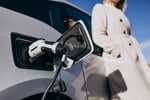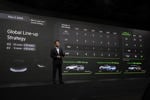Profits are going to be harder to find in the motor industry according to Ed McCabe, the former managing director of the Hartwell dealer group.
The pressure will come from the impending changes to Block Exemption, new entrants to the market and the impact of new technology.
Having observed that the profitability of motor retail in the UK was poor, he told the recent Digital Dealer Fair it was likely to get worse.
“Manufacturers spent years squeezing out costs in the production and assembly processes,” he said.
“Then they focused on their component suppliers. Now they are looking at distribution: how they can take cost out and get the cost of the vehicles down and also make money themselves.
“There is simultaneously strong pressure to improve shareholder returns. You see a lot of groups and dealerships closing down. Unless retailers can get shareholder returns up, the people that pump money into the sector – fund managers, venture capitalists, private capitalists and so on – won't be wanting to invest in large quantities.”
Having suggested that Block Exemption would be renewed to protect automotive jobs in France and Germany, Mr McCabe said the internet had given power to car buyers.
Sales volumes achieved by market newcomers such as Jamjar, Virgin and OneSwoop were small. “But they have forced retailers to think afresh about the way they go to do business, the way they price, the transparency of the pricing and also the value they are offering to consumers,” he said.
New technologies such as digital TV empowered consumers and provided more pricing transparency.
“They are also creating great opportunities to boost productivity and take cost out of the system,” he said. “Some attempts may have failed but without doubt the technologies themselves do give us real opportunities to get more efficient, more cost effective, more productive.”
Customer relationship management (CRM) technology was among the most important developments in providing a lot more information. This included what customers wanted, purchasing behaviour, when they were thinking about changing their vehicle and what drove them to a decision.
Mr McCabe said: “Technology will change the way dealers do business, both in the way they interact with customers and in the way they interact with the manufacturers.
“The real winners in the market place will be the ones with that information, who know what customers are looking for, who know their needs and know their thinking.”
Online processes must meet needs of retail customers
With technology rapidly changing the world, parallel importer Broadspeed had embraced it and moved forward more quickly than other internet companies, said Simon Empson.
“We are trying to box the whole thing into an online process that consumers will really accept,” he said.
“I believe the key motivator for somebody shopping online is price. Online car selling is an arbitrage-driven opportunity – but we have sold seven cars online at full UK list price because it is easier and the buyers did not have to face a salesman.”
Cars were sold around the world – mostly identical in terms of technical specification – for prices that were remarkably different, Mr Empson said. The pre-tax price on an identical VW Golf varied between £9,020 in the UK and £5,580 in Finland.
“I have often heard it rumoured that Volkswagen sells 8% of its cars in the UK but makes 40% of its European profits here,” he said. “With Ford it is 11% of its passenger cars and 70% of its profits.”
Parallel import volumes rose to 140,000 last year, Mr Empson said. Once fleet and business sales were excluded this accounted for 25% or 30% of total retail sales. “The website has attracted 1.3m unique visitors since the company was founded and daily visitor numbers ranged from 2,000 to 5,000,” he said.
“E-buyers provide planning and car buying data because we are independent,” Mr Empson said. “No manufacturer, importer or dealer could obtain that information.”
Keep buyers advised on progress of orders
Online car sales at Wundercars were on track for £40m this year, said Marc Clarke. Many were generated by 'shadow websites' on corporate intranets as an element within employee benefit schemes.
Employing 10 experienced car sales staff to handle customer enquiries resulted in one in nine enquiries from the website being converted into sales.
“Experience shows customers want regular updates,” said Mr Clarke. “Dealership sales staff are generally reluctant to pick up the phone and give customers bad news or no news.
Yet we get responses back saying 'thank you for letting me know how my order is progressing'.”
The company has used software supplier ESC to develop an enquiry handling system called e-flow, which engages clients in e-mail dialogue. “If the dialogue is there it greatly enhances the chances of a sale.
“Of course customers want value for money, but they also want no haggles, or hidden extras. If they feel they have been fairly treated and the deal is transparent, that builds loyalty.”
The most important issue was the speed of response, said Mr Clarke.
Keeping cars and occupants in touch with world
James Batchelor, who said telematics was becoming increasingly important to dealers. added: “It is about connecting the vehicle to the outside world.
“Using telecommunications, we are able to bring information into the car and out of the car, and we can bring services into the occupants of the car.”
The variety of potential telematics services was wide. It ranged from 'concierge' services (such as booking restaurants) and entertainment to everything available through the internet. But safety and security services were likely to be most important.
These were 'e-calls' (dealing with emergencies) and 'b-call' (handling breakdowns or calls for assistance).
“If you have an emergency or a break-down, automatically a voice link is established with an operator,” said Mr Batchelor. “A link is established so the operator knows your exact location and can dispatch either the breakdown services or the rescue services as necessary.”
Other forms of telematics such as diagnostics will be specific to individual car manufacturers. “As you are driving along,” said Mr Batchelor, “your car can self-diagnose a problem and it can be in communication with the dealer network, with the factory.”
In theory it was possible to download updates to engine management software.
“One of the reasons telematics has not taken off in line with earlier projections is that some of the members in the supply chain have not really got their act together,” he said. “There is a fight going on for who 'owns' the customer – the car manufacturer or telecommunications company providing the means to link to the car occupant.”
Analysts' reports set out “mind boggling projections” for the potential market for telematics.
Trafficmaster believed “if motorists will pay at all, they are only prepared to pay a little for telematics services”.
Mr Batchelor said: “Nearly all the projections that you read are vastly optimistic. Even so, there is little doubt telematics will eventually be big business.”
Manufacturers are seeking to introduce telematics to extend their brand by demonstrating capability in technology. “But it goes beyond brand considerations,” he said.
“A lot of this is to do with the customer because involvement with telematics changes the relationship that the manufacturer and the dealer organisation has with the car customer. It re-positions what currently happens.”
Telematics set to boom
Car manufacturers and aftermarket suppliers are investing heavily to capitalise on the potential of the telematics market.
Ford is working in partnership with Vodafone to offer basic services in the Focus from May, with the Mondeo and Galaxy following in late August. The extra cost option will offer instant traffic information from Trafficmaster, accident and emergency services and satellite navigation both on-screen and with a voice. 'Concierge' services may be added in 2003.
Volvo already offers a telematics service called Volvo On-Call in Scandinavia, and plans to extend the service to the UK by the end of next year. It expects the option to be chosen by 10% of buyers of bigger models, suggesting it will be of significant value to corporate clients.
The new Jaguar X-type includes telematics as an extra cost option. Accident and emergency services are the 'second tier' service – combining traffic information and a concierge service – carrying an additional charge.
Colin Tivey, X-type chief production engineer, expects 5% of buyers to choose telematics, but believes penetration will grow in parallel with the growth of services.
Telematics will reach other Jaguar models (other than the XK) over the next 18 months.
BMW GB is poised to introduce the Assist telematics service next month following a successful launch in Germany. The Assist service available in the 3, 5 and 7 Series – plus the X5 offroader – offers basic accident and emergency services.
Traffic information is also provided free of charge, although the UK has yet to be announced.
Global Telematics has extended the functionality of its Orchid telematics vehicle tracking solution with the launch of a 'real time' traffic and travel information (TTI) service providing fleet managers with full up-to-the-minute congestion, incident and other traffic-related information.
The service is based on an agreement with Trafficlink, the market leader in the supply of TTI to UK radio stations. Orchid TTI is a web-based service, and the only solution to actively 'push' information to users once they are logged in – either on a five, 10 or 15-minute basis or on demand.
This information is then displayed using an intuitive icon-based system, overlaid onto a user's existing street-level map. Specific icons identify road problems.
More highlights from the Digital Dealer Fair...
'Dealers will become delivery points for direct sales by manufacturers and powerful multi-brand retailers'
The changing retail market structure will lead to a continued fall in the number of dealers, and those that remain "will need to re-evaluate their business models to see where they can add the greatest value for the consumer," according to Dowshan Humzah, OneSwoop marketing manager.
He suggested dealers would increasingly become "fulfilment and distribution points" for direct sales and will therefore need to focus on service and used car sales.
"Traditional automotive retailing is still locked in its historical structure," said Dowshan Humzah, marketing manager of OneSwoop, "but the dinosaurs will evolve - despite the manufacturers' vested interest in maintaining the status quo".
Mr Humzah maintained that Block Exemption was likely to be scrapped or severely diluted in September 2002, but was convinced dealerships have an important future role, providing they adapt to quickly changing market conditions.
Manufacturers are wary of moving too quickly into direct sales via the web or any other channel. Manufacturers "certainly can and should sell direct".
An increasing number are testing the processes involved. "Despite the actions of a few of them, most would not want to alienate dealers that are already wary and nervous," said Mr Humzah.
"But while they want to maintain the status quo, they do not want to surrender the internet and other virtual sales channels, to new players such as OneSwoop and other new entrants such as supermarkets that nay enter the market with the likely end of Block Exemption."
Analysis by OneSwoop suggests there over one million British people with internet access are planning to buy a car within 12 months.
Online sales of new cars will rise from 19,000 last year to 53,000 in 2001 and then grow to 281,000 in 2003 and 603,000 in 2005. Over the same period, the total number of online car sales throughout Europe as a whole will rise from 53,000 in 2000 to 1.43 million in 2003 and 2.86 million two years later.
Manufacturer drive for higher sales could doom half of dealers
Manufacturers' drive to more than double sales at their outlets could spell the end for more than half of UK dealers, according to Professor Garel Rhys.
The automotive industry appears to go through a major change every thirty years, observed professor Garel Rhys, director of the Centre for Automotive Industry Research at Cardiff Business School, and normally the changes last ten years or so.
"This time it could last longer than ten years," he said, "because it is not just the vehicle makers, but also the component sector and the retail side of the industry."
In Britain there are 6,000 franchised dealers selling an average of 450 new cars each year, whereas in France and Italy the average is only 150.
Vehicle makers have now redefined the optimum size and are now looking at 1,000 units. "To get to 1,000 from 450 they will have to more than halve the number of outlets," he said.
If Block Exemption were not renewed there would be a 'free-for-all', he suggested. "For a while it will be of great benefit to the consumer, but you would soon get something probably approaching the 80-20 rule, with 80% of cars sold by about 20% of the dealerships."
The European Commission will have severe worries about scrapping Block Exemption, Prof Rhys argued.
Doing so would prompt a 'phenomenal' number of continental dealers going bankrupt, large numbers of unemployed staff and a threat of direct action by people affected by the change. In the longer term, it would probably be of little value to the consumer, with manufacturers and major dealer groups having greater power to control prices. "It actually might be too late for the vehicle manufacturing industry to take other than a dip in the water in terms of ownership of their dealer networks," said Prof Rees. "I find it incredibly naive that the industry thinks they could move into the distribution sector without any movement at DG4, the Competitions Directorate. It is by no means certain would they be allowed to do that."
Internet marketing a 'two edged sword' threatened by the delete button
Analysis of website usage is essential to maximising the sales potential provided by e-commerce, according to Peter Coomber, data mining manager of Autotrader Interactive.
Marketing using the internet is very much a two edged sword, in the view of Peter Coomber, data mining manager with Autotrader Interactive.
"It gives a huge advantage in sending information to the customer very cheaply and very effectively," he said. "The problem is it is only really a question of pushing the delete key and your message is easily got rid of. So you have less time than ever to really grab people's attention."
Research into people's use of your website is preferable to traditional marketing surveys, he suggested.
"Not only do you have the transactional information, you can also find out what they did not buy. You can track through what else they looked at, what they discounted and fundamentally how they came to that decision."
Research into users of autotrader.com reveals that the most popular non-fantasy vehicles are those which are recently introduced and those that are aspirational or image-led.
"We get twice as many enquiries for VW Golf as for anything else," said Mr. Coomber, "but people are going for the more aspirational models such as GTI and VR6s."
Making a profit from selling cars is tough now - but it will get tougher, according to Ed McCabe, chief executive officer of Ebbon-Dacs and one-time group managing director of Hartwell plc.
Amongst the causes are impending changes to Block Exemption, new entrants to the market and the impact of new technology.
"Manufacturers spent years squeezing out costs in the production and assembly processes; then they focused on their component suppliers," he said.
"Now they are looking at distribution: how they can take cost out and get the cost of the vehicles down and also make money themselves."
"There is simultaneously strong pressure to improve shareholder returns," said Mr McCabe. "You see a lot of groups and dealerships closing down.
"Unless retailers can get shareholder returns up, the people that pump money into the sector - fund managers, venture capitalists, private capitalists and so on - won't be wanting to invest in large quantities."
Having suggested that Block Exemption will be renewed to protect automotive jobs in France and Germany, Mr McCabe said the internet had given power to car buyers.
While the sales volumes achieved by market newcomers such as Jamjar, Virgin and OneSwoop are small, "they have forced retailers to think afresh about the way they do business, the way they price, the transparency of the pricing and also the value they are offering to the consumer."
New technologies such as digital TV empower consumers and provide more pricing transparency. "They are also creating great opportunities to boost productivity and take cost out of the system," he said
Dealers must embrace technology if they are to survive against dotcom predators, says Kamal Bengougam, chief executive officer of Auto Online..
He believes dealers need to spend more time understanding their customer requirements. A failure to do this is one of the key reasons why newcomers such as dotcom 'virtual retailers' have entered the industry.
"Nowadays customers do not want to compromise," he said. "Very few people will compromise on colour or on a feature. The closer you come to finding exactly what they want, the closer you are to a sale."
Technology has a key role to play in achieving this goal. "In order to survive," he said, "You are going to have a technology-based solution."
But a simple website is not enough because there are too many already. "You need to innovate," said Mr. Bengougam. "Senior managers should listen to the young people in their organisation. Tomorrow's generation will be the ones sustaining your value proposition."
Online brochures are one area of opportunity worthy of consideration. "You do not have the printing cost and you don't have to post them," he said.
"Not only do they give easy access to information. You can also transform the information every day if you want. It is highly flexible, very scaleable and it minimises costs."
Dealerships should also explore ways to integrate their phone system with their dealer management system and customer relationship management systems.
"You can now have telephone systems that integrate with your CRM system so when someone calls you, you know who they are and can pick up their database right away and you can actually remember what car it is they were looking at or what the problem was so you can address the issue really well," he said.
Working with IT specialists has allowed CD Bramall to move painlessly into online retail, according to group managing director Keith Hartrick.
A prime example of the smooth integration of the internet into sales operations is its Lexus dealership in Plymouth which achieves two thirds of its used car sales through the internet to customers between 50-200 miles away.
And at specialist BMW, Mercedes and Audi dealerships between 25-30% of new car sales come as a result of internet searches by customers.
But Mr Hartrick told delegates that rather than it being a new channel to market, "the internet is still primarily used to gather information. Sales still happen at the dealership, but we find we are dealing with a much more informed customer. We also find internet users want the comfort of dealing with a recognised bricks and mortar business rather than an unknown name."
The hype surrounding the dotcom boom was similar to the excitement generated by Argos catalogue shops 30 years ago, he suggested. Headlines suggested they would wipe out traditional shops, but in practice Argos simply offered another channel to market.
"As a retail dealer group we can offer the online buyer everything they want," said Mr. Hartrick.
"We can offer a seamless process, whether the customer buys via the internet or through a showroom."
He attributed much of the 50-dealership group's success to its partnership with Global Remarketing because "they offered not just IT and internet literacy and understanding, but also motor trade expertise."
Most manufacturers will not be moving to direct sales, according to Lindsay Levin, chief executive officer of the Whites Group.
Major changes to Block Exemption will result in a fundamental shift in car retailing, with some manufacturers bypassing dealers to sell direct via the internet and other sales channels, said Mrs Levin. "While pure internet car retailers have a shaky future," she said, "it does not mean the internet is not a very important piece of the future retailing mix."
Future changes to Block Exemption are "likely to be more than the manufacturer's have wanted," she said. "A significant shift in the way in which cars are sold is pretty serious for the manufacturers."
Major brands such as Wal-Mart and Tesco could very easily enter the market, though attention will probably be focused on 'cherry-picking' models with the highest margins.
"They have huge power in terms of customer relationship management where they put us all to shame, together with far more sophisticated systems and processes for doing that," Mrs Levin said.
"Since they are already selling across a very, very wide range of products from financial services through to all sorts of consumer goods, they know an awful lot about their customers."
In addition to the threat of new entrants and changes to Block Exemption, price pressures and the growing power of major dealer groups worry manufacturers. "So what are the manufacturers' options in terms of this selling direct issue?" she said.
"I would dismiss straight away the 'internet-only' strategy. Then there is the model some are starting to move towards - notably Mercedes - with major centres and some sort of hybrid support structure, with smaller service centres owned or part-owned by the manufacturers."
Some manufacturers are pursuing a "partnership direct interest route" in collaboration with major dealer groups.
"Basically they are keeping their options open, always with an eye to the future legal framework for distribution and seeking to keep as much control as possible of the channels to market."
Mrs Levin nevertheless believes dealers and manufacturers will see a mutual benefit from working together.
"Our ability to change and improve what we do - if we are not working in cooperation with the manufacturers - is very severely hampered and vice versa. This flow from where a car is made through to the delivery to the customer needs to be really streamlined," she said, "and I think there is a growing realisation of the need for partnership."
Dealers will be given greater protection from early termination of contracts under the forthcoming review of Block Exemption.
The prediction was made yesterday at the two-day Automotive Management Digital Dealer Fair in Birmingham by Ed McCabe, chief executive officer of Ebbon-Dacs.
He told the audience during his seminar, entitled 'Sea change in motor retailing', sponsored by Auto Online, the review would see manufacturers made to treat their dealers with greater sensitivity.
He said: “We will get away from the situation of manufacturers telling their dealers, 'thank you very much, here's two years termination and goodbye'. Contracts would not just be for two years, but possibly up to five years.”
There would, Mr McCabe predicted, be a loosening of dealers' ties to a manufacturers' chosen finance house and parts' suppliers.
“We may move towards the US model where it's much harder for a manufacturer to get rid of a dealer and they have to buy them out or compensate a dealer to 'disappear',” he said.
On the day of its launch Cap Network, a new business alliance bringing together Cap and AutoLocate, announced a strategic partnership with Microsoft.
Cap Network will provide used car pricing information to Microsoft's automotive portal www.carview.co.uk together with more than 4,000 pages of information on every make, model and trim of vehicle available for sale in the UK, creating what the two companies claim will be the most comprehensive new car research facility on any UK website.
The partnership between MSN Carview and Cap Network follows the previous announcement of Carview's alliance with AM100 leading dealer group Pendragon to create an online new car buying service on Carview.co.uk.
Making the announcement at the Digital Dealer Fair, where the Cap Network was unveiled, Shane O'Neill, the network's chief executive, said: “This opens up exciting possibilities for the industry. Microsoft has unrivalled expertise in software development and in developing internet services for consumers. Cap Network is the leader in developing comprehensive, vehicle pricing information for use on the internet.
“Through working together the potential to create class-leading services for both consumers and the motor industry is enormous.”
And John Brewer, director of Carview Europe, said the partnership was a step towards creating a website “unrivalled for its depth of car research, ownership and buying services”.
“Ultimately we aim to offer our customers access to a wide range of car related information, in any place, on any internet enabled device. This deal moves us a step closer to being able to realise this goal.”
Carview is due for launch in the UK the spring, integrated into the msn.co.uk website which attracts 10.5m users per month.
The internet should be seen as a threat to dealers, rather with sound development strategies and investment plans it can be used as a valuable new route to market – but keep your web operation “simple and slick”.
The advice came from TMS Group's deputy chairman Peter O'Connor in his seminar presentation at the fair entitled 'How can dealers survive change', sponsored by Cap Network.
He said the three rules of succeeding on-line - attracting customers, converting interest into sales and customer retention - should be familiar to dealers already.
“Haven't we been achieving these three for a long time? We provide a good service and we deliver the car on time – that's the only way to keep customers,” he said.
With this achievement as the basis, Mr O'Connor said, it was important for a dealership to then have a strategy for its website development that's appropriate to the present business, but also allows for changes.
“The internet is here to stay, so start to respond. Decide where your business is going and get your staff on board. Develop your IT approach including email, dealer management systems and digital cameras, and appreciate your assets. You have customers that you see more than once so talk to them and find out how their needs and expectations have changed.
“Then see what aspects of new IT can customers benefit from and have IT wish-list.”
Examples were providing customers the ability to book test drives on-line and allow suppliers to check parts' availability via the website.
Using used cars as an example, Mr O'Connor suggested that many dealers were not using technology well in an area “vital to the survival” of many businesses.
“You should use technology to show how good your stock is, emphasise your service standards, send a brochure via email to potential customers – and include a location map.”
He said internet business is expected to account for 10-20% of TMS Group's sales activity this year, some of which was new business. The group's IT investment had been in the region of £100,000.
The Digital Dealer Fair saw the first presentation of the Automotive Management award for dealer website of the year to TMS Group.
The group's deputy chairman Peter O'Connor received the award from Mark Cowling, Cap Network's chief economist.
The award comes on the back of dealer group website reviews featured in the Dealer Dotcom section of Automotive Management.
David Sumner Smith, AM's information technology editor and chairman of the Digital Dealer Fair seminars, said: “TMS is not amongst the biggest dealer groups, but it has taken a very important initiative of integrating the web with the back office sales process and news, including feeds from motor shows.”
Mr O'Connor said: “We saw the potential of the internet early on, both in terms of the threat and opportunity and initially the policy was just to get on-line. But it struck me this wasn't going to work without getting our people involved. We started to evolve that strategy so we no longer had to rely on outside website designers to change the look of the site and it's now done locally, which promotes staff ownership.”
TMS Motor Group's website is at www.tmsgroup.co.uk.
CD Bramall is to re-launch its website at the end of May, inspired by the success of its initial on-line venture which now accounts for 6% of its sales.
Detailing the re-launch at the Digital Dealer Fair was Keith Hartrick, group managing director, in his seminar presentation 'Partnerships are the key to success', sponsored by Global Remarketing.
He said: “The new website will be a lot more user-friendly and interactive. It will provide the customer with the opportunity to do everything from buying the car, arranging finance and insurance, look at the spec of any new car in considerable detail, driving additional inquiries to us.”














Login to comment
Comments
No comments have been made yet.